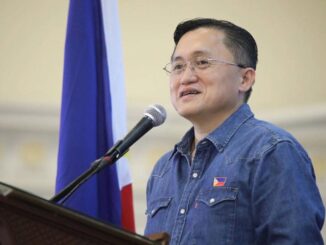
MANILA, Philippines — Sen. Bong Go is questioning the legality of the Department of Finance (DOF)’s order to have the P89.9 billion in excess funds of the Philippine Health Insurance Corp. moved to the national treasury to finance this year’s unprogrammed appropriations.
“As chair of the Senate committee on health and as part of our oversight functions on the implementation of the Universal Health Care Law, I will be seeking answers from PhilHealth,
Department of Budget and Management, DOF and Department of Health on the propriety and legality of the purported transfer of around P90 billion, representing unused government subsidy for PhilHealth, to the national treasury,” Go said.
He also questioned the state health insurer for having P89.9 billion in excess funds instead of using these to help indigent patients or to bring down the contribution rate.
The excess funds should be used to fully implement the Universal Health Care law instead of being reverted to the treasury, Go said.
“It is unacceptable that there was funding that was not used to help the PhilHealth members. Why does PhilHealth have excess funds when there are many patients in need of help?” Go said.
Medical groups opposed to the transfer of PhilHealth funds said there is a need to create an independent agency that will focus on the immediate enhancement of people’s health benefits.
At a press briefing yesterday, Dr. Antonio Dans, president of the Asia Pacific Center for Evidence-Based Healthcare, called on President Marcos to make possible the establishment of an independent agency for benefit development through the issuance of a decree.
“This independent agency for benefit development can be realized through the issuance of a decree by the President. This is just one of the systemic solutions that should be discussed so that the problem of PhilHealth as a corporation can be addressed,” Dans said.
He added PhilHealth lacks the manpower to exercise such function and there is a need to consult research and academic institutions in institutionalizing such arrangement.
“Benefit development is crucial and PhilHealth lacks human resources to focus on this benefit development. It will be a continuing task and it will require huge investment in terms of human resources,” said Dans.
“You have to consider things such as how much money will be needed to expand the benefits, who are the target beneficiaries – will this cover both the rich and the poor, will there be savings while we implement these health care programs. That is why our proposal, for the meantime, is to conduct a study on benefits with the help of academic and research institutes,” Dans said.
They are also calling on the President to order the return of PhilHealth’s unused funds to benefit indigents needing medical attention.
Over 60 medical societies led by the Philippine Medical Association (PMA), the Philippine College of Physicians and the Asia Pacific Center for Evidence-Based Healthcare signed a statement urging President Marcos to release a directive to return the P89.9 billion to PhilHealth, to be used for health care needs of the poor.
According to the doctors, PhilHealth has underspent because it has not sufficiently expanded its benefit packages and there is still a huge unmet need for health care in the Philippines.
The PMA said Marcos should institute measures to ensure the immediate enhancement of health benefits and form an independent agency to do this.
Dr. Bu Castro, past president of the PMA, said they will file a petition before the Supreme Court questioning the legality and the constitutionality of the transfer of PhilHealth funds to the general fund.
“This is for all the Filipinos who are automatically covered by the Universal Health Care Law,” said Castro.
In April, the DOF released a circular mandating government-owned and controlled corporations to remit their excess funds to the national coffers.
The DOF ordered PhilHealth to remit P89.9 billion in excess funds to the unprogrammed appropriations of the General Appropriations Act. — Rhodina Villanueva





Be the first to comment